
The Sulphur Institute, or TSI, is an international non-profit organization which acts as a global advocate for sulfur and sulfur producers. [1]

The Sulphur Institute, or TSI, is an international non-profit organization which acts as a global advocate for sulfur and sulfur producers. [1]
The Sulphur institute was founded in 1960, initially working with companies involved in the mining of sulfur using the Frasch process. With the increase of the Claus process for extracting sulfur from natural gas and oil, TSI's members now include multinational energy companies. [2] The Sulphur Institute connects these sulfur producers with sulfur's largest consumer markets (fertilizers and construction materials), transporters, traders, and service providers. [3] Today, The Sulphur Institute's member companies include a host of companies from five continents involved with producing, consuming, trading, adding value, or supplying services to the sulfur industry. [4]
TSI is actively engaged in event planning and publishing print materials for the benefit of all sulfur stakeholders. Their work includes international meetings, and developing field activities in regions where sulfur has an economically beneficial role. TSI provides individuals with access to sulfur related publications. In addition to these meetings and printed works, TSI has programs in four main aspects of the sulfur industry: Environment, Health, and Safety; Information and Advocacy; Sulphuric Acid; and Transportation Regulations and Logistics. [5]
TSI's Environment, Health, and Safety program addresses environmental and safety issues surrounding the transportation, production, and storage of sulfur. The Sulphur Institute's program allows regulatory agencies and industry stakeholders to connect, exchange knowledge, and develop practices which improve the safety of the industry. [6]
The Sulphur Institute provides members, government and non-government agencies, and industry stakeholders accurate information on sulfur. TSI has served as a source of industry information for many publications including the Wall Street Journal. [7] TSI is often quoted by publications within the industry as well. [3] The information gathered by TSI is made available through a number of publications, webinars, and speaking engagements.
The Sulphur Advocacy program encourages the use of sulfur worldwide in many applications, to promote sulfur as a valuable fertilizer. "Through advocacy, education, and promotion, the program seeks to facilitate increased sulfur demand by removing hurdles for private industry to develop commercial scale sulfur-based fertilizer businesses." [8]
TSI has worked in China and India to develop and promote the use of sulfur. China is one of the major consumers of sulfur, mainly because of its phosphate fertilizer industry. [3] TSI began encouraging sulfur market growth in China beginning in 1994 and has continued working with Chinese organizations. [9] [10] In the 1984 The Sulphur Institute began working with representatives in India to encourage similar growth in sulfur usage. TSI worked with the International Fertilizer Industry Association and the Fertilizer Association of India to provide activities and resources on the use of sulfur in agriculture. [11]
TSI serves as a spokesperson for the sulfur industry with its Transportation Regulations and Logistics program. "TSI monitors for proposed changes to regulations impacting transportation and handling of sulfur and sulfur compounds." [8] Their program covers transportation by rail, road, and sea transportation on regional, national, and international levels. [12]
The Sulphur Institute holds an international symposium annually titled The Sulphur Institute's Sulphur World Symposium. The symposia are attended by producers, consumers, and traders in sulfur, as well as industry service providers, and feature speakers discussing a range of topics relating to sulfur. [13]
The 2010 Sulphur World Symposium was held in Doha, Qatar from April 12 through April 15, 2010. [14] The 2010 symposium featured a tour of the Ras Laffan Industrial City, which is not normally available to the public.
Publications by The Sulphur Institute include market studies, industrial publications, general brochures about sulfur, and brochures on the agricultural uses of sulfur. Symposium proceedings are also available. Most publications are available in English, with several available in Spanish, Chinese, and Hindi. [15]

Sulfur (or sulphur in British English) is a chemical element with the symbol S and atomic number 16. It is abundant, multivalent and nonmetallic. Under normal conditions, sulfur atoms form cyclic octatomic molecules with a chemical formula S8. Elemental sulfur is a bright yellow, crystalline solid at room temperature.
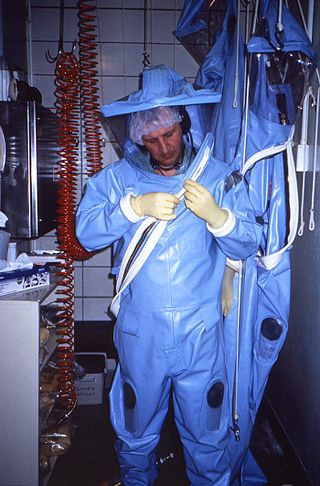
Biosafety is the prevention of large-scale loss of biological integrity, focusing both on ecology and human health. These prevention mechanisms include conduction of regular reviews of the biosafety in laboratory settings, as well as strict guidelines to follow. Biosafety is used to protect from harmful incidents. Many laboratories handling biohazards employ an ongoing risk management assessment and enforcement process for biosafety. Failures to follow such protocols can lead to increased risk of exposure to biohazards or pathogens. Human error and poor technique contribute to unnecessary exposure and compromise the best safeguards set into place for protection.
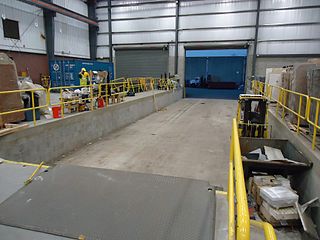
Logistics is a part of supply chain management that deals with the efficient forward and reverse flow of goods, services, and related information from the point of origin to the point of consumption according to the needs of customers. Logistics management is a component that holds the supply chain together. The resources managed in logistics may include tangible goods such as materials, equipment, and supplies, as well as food and other consumable items.

Organic certification is a certification process for producers of organic food and other organic agricultural products, in the European Union more commonly known as ecological or biological products. In general, any business directly involved in food production can be certified, including seed suppliers, farmers, food processors, retailers and restaurants. A lesser known counterpart is certification for organic textiles that includes certification of textile products made from organically grown fibres.

Extended producer responsibility (EPR) is a strategy to add all of the estimated environmental costs associated with a product throughout the product life cycle to the market price of that product, contemporarily mainly applied in the field of waste management. Such societal costs are typically externalities to market mechanisms, with a common example being the impact of cars.
The Research and Innovative Technology Administration (RITA) is a unit of the United States Department of Transportation (USDOT). It was created in 2005 to advance transportation science, technology, and analysis, as well as improve the coordination of transportation research within the department and throughout the transportation community.

A freight forwarder, or forwarding agent, is a person or a company who, for a fee, organizes shipments for the shipper by liaising with carriers. A forwarder does not move the goods but acts as an agent in the logistics network.
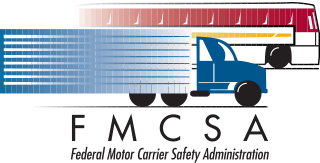
The Federal Motor Carrier Safety Administration (FMCSA) is an agency in the United States Department of Transportation that regulates the trucking industry in the United States. The primary mission of the FMCSA is to reduce crashes, injuries and fatalities involving large trucks and buses.

Food safety in China is a concern relating to agriculture in the world's most populated country. China's principal crops are rice, corn, wheat, soybeans, and cotton in addition to apples and other fruits and vegetables. China's principal livestock products include pork, beef, dairy, and eggs. The Chinese government oversees agricultural production as well as the manufacture of food packaging, containers, chemical additives, drug production, and business regulation. In recent years, the Chinese government attempted to consolidate food safety regulation with the creation of the State Food and Drug Administration of China in 2003; officials have also been under increasing public and international pressure to solve food safety problems. Chinese Vice Premier Li Keqiang said, "Food is essential, and safety should be a top priority. Food safety is closely related to people's lives and health and economic development and social harmony," at a State Council meeting in Beijing.
The American Road & Transportation Builders Association (ARTBA) is a trade association representing the transportation construction industry in the United States and is based in Washington, D.C., United States.
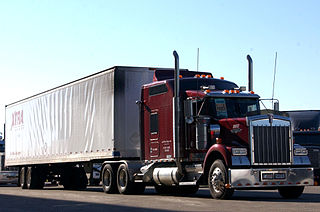
The trucking industry serves the American economy by transporting large quantities of raw materials, works in process, and finished goods over land—typically from manufacturing plants to retail distribution centers. Trucks are also used in the construction industry, two of which require dump trucks and portable concrete mixers to move the large amounts of rocks, dirt, concrete, and other building materials used in construction. Trucks in America are responsible for the majority of freight movement over land and are tools in the manufacturing, transportation, and warehousing industries.
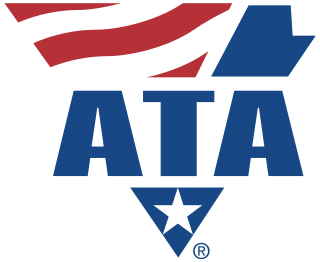
The American Trucking Associations (ATA), founded in 1933, is the largest national trade association for the trucking industry. ATA represents more than 37,000 members covering every type of motor carrier in the United States through a federation of other trucking groups, industry-related conferences, and its 50 affiliated state trucking associations. Former Governor of Kansas Bill Graves was replaced by Chris Spear as the ATA's president and CEO in July 2016.

The American Moving & Storage Association (AMSA) was the non-profit trade association representing members of the professional moving industry based primarily in the United States. Its approximately 4,000 members consisted of van lines, their agents, independent movers, forwarders, industry suppliers, and certain individuals and organizations.
The term food system describes the interconnected systems and processes that influence nutrition, food, health, community development, and agriculture. A food system includes all processes and infrastructure involved in feeding a population: growing, harvesting, processing, packaging, transporting, marketing, consumption, distribution, and disposal of food and food-related items. It also includes the inputs needed and outputs generated at each of these steps. Food systems fall within agri-food systems, which encompass the entire range of actors and their interlinked value-adding activities in the primary production of food and non-food agricultural products, as well as in food storage, aggregation, post-harvest handling, transportation, processing, distribution, marketing, disposal, and consumption. A food system operates within and is influenced by social, political, economic, technological and environmental contexts. It also requires human resources that provide labor, research and education. Food systems are either conventional or alternative according to their model of food lifespan from origin to plate. Food systems are dependent on a multitude of ecosystem services. For example, natural pest regulations, microorganisms providing nitrogen-fixation, and pollinators.

The Consumer Product Safety Improvement Act (CPSIA) of 2008 is a United States law signed on August 14, 2008 by President George W. Bush. The legislative bill was known as HR 4040, sponsored by Congressman Bobby Rush (D-Ill.). On December 19, 2007, the U.S. House approved the bill 407-0. On March 6, 2008, the U.S. Senate approved the bill 79-13. The law—public law 110-314—increases the budget of the Consumer Product Safety Commission (CPSC), imposes new testing and documentation requirements, and sets new acceptable levels of several substances. It imposes new requirements on manufacturers of apparel, shoes, personal care products, accessories and jewelry, home furnishings, bedding, toys, electronics and video games, books, school supplies, educational materials and science kits. The Act also increases fines and specifies jail time for some violations.

PeriShip is a logistics provider for the perishable food industry. It was founded in 2001, and is based in Branford, Connecticut. The company exclusively uses FedEx for transportation.
The wet sulfuric acid process (WSA process) is a gas desulfurization process. After Danish company Haldor Topsoe introduced this technology in 1987, it has been recognized as a process for recovering sulfur from various process gases in the form of commercial quality sulfuric acid (H2SO4) with the simultaneous production of high-pressure steam. The WSA process can be applied in all industries where sulfur removal presents an issue.
Mike Monroney Aeronautical Center is a regional office of the United States Federal Aviation Administration on the grounds of Will Rogers Airport in Oklahoma City. With around 7,500 direct federal employees, the Aeronautical Center is one of the Department of Transportation's largest facilities outside the Washington, DC area, and one of the 10 largest employers in the Oklahoma City metropolitan area. It is named for Senator Mike Monroney of Oklahoma, who wrote and sponsored the Federal Aviation Act of 1958.
The petroleum industry in India dates back to 1889 when the first oil deposits in the country were discovered near the town of Digboi in the state of Assam. The natural gas industry in India began in the 1960s with the discovery of gas fields in Assam and Maharashtra. As on 31 March 2018, India had estimated crude oil reserves of 594.49 million metric tonnes (Mt) and natural gas reserves of 1339.57 billion cubic metres of natural gas (BCM).

Silvia Hildegard Haneklaus is a German agricultural scientist and researcher specialised in Plant nutrition and Soil science.